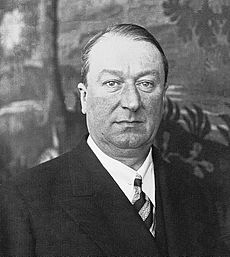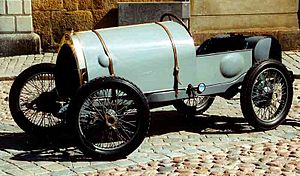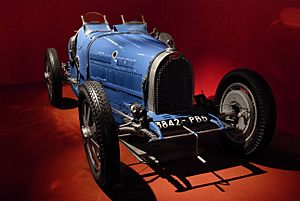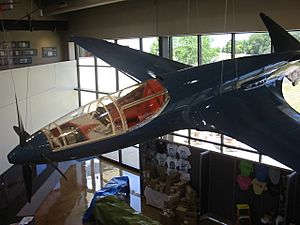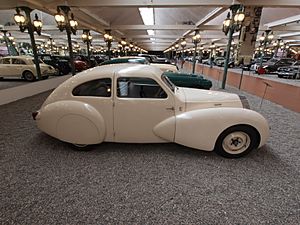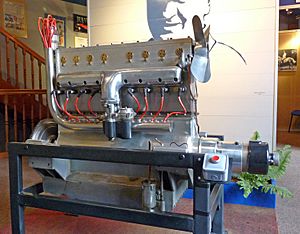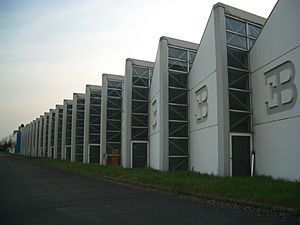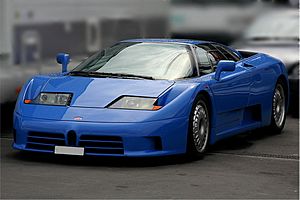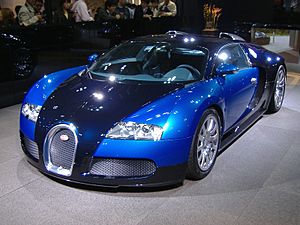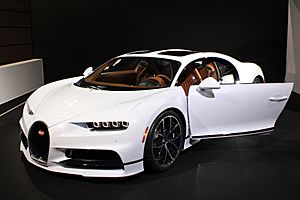Bugatti facts for kids
 |
|
| Private | |
| Industry | Automotive |
| Fate | Sold to Hispano-Suiza (1963) |
| Founded | 1909 |
| Founder | Ettore Bugatti |
| Defunct | 1963 |
| Headquarters |
Molsheim, Alsace
,
France
|
|
Key people
|
|
| Products | Automobiles |
Automobiles Ettore Bugatti was a famous French company that made amazing, high-performance cars. It was started in 1909 by an Italian designer named Ettore Bugatti in a town called Molsheim, which was then part of Germany but is now in France. Bugatti cars were known for their beautiful designs and for winning many races.
Some of the most famous Bugatti cars include the speedy Type 35 Grand Prix cars, the luxurious Type 41 "Royale", and the stylish Type 57 "Atlantic" and Type 55 sports cars.
After Ettore Bugatti passed away in 1947, and his son Jean had died earlier in 1939, the company faced big challenges. With only about 8,000 cars ever made, Bugatti struggled financially. They released one last model in the 1950s before the company was sold in 1963 for its airplane parts business.
Later, in 1987, an Italian businessman bought the Bugatti name and brought the brand back to life as Bugatti Automobili S.p.A. Today, the Bugatti name is owned by Bugatti Rimac since 2021, continuing to create incredible supercars.
The Story of Bugatti Cars
The founder, Ettore Bugatti, was born in Milan, Italy. He started his car company in 1909 in Molsheim, a region known as Alsace. This area was part of Germany from 1871 to 1919. Bugatti cars were special because of their detailed engineering and artistic designs. This artistic touch came from Ettore's family; his father, Carlo Bugatti, was a famous designer of furniture and jewelry.
Ettore Bugatti's Vision
Ettore Bugatti's cars were not just machines; they were works of art. He believed that every part of a car should be beautiful and perfectly made. This focus on both engineering and art made Bugatti cars unique and highly desired.
Early Challenges and Comebacks
During World War I, Ettore Bugatti had to leave his factory. But as soon as the war ended, he quickly returned to Molsheim. In October 1919, he proudly showed three new light cars at the Paris Motor Show. These cars were based on his earlier designs and featured advanced engines.
Racing to Victory
Bugatti cars were incredibly successful in early Grand Prix motor racing. In 1929, a Bugatti car won the very first Monaco Grand Prix. Bugatti's racing achievements reached a peak when driver Jean-Pierre Wimille won the famous 24 Hours of Le Mans race twice. He won in 1937 with Robert Benoist and again in 1939 with Pierre Veyron.
The small Bugatti Type 10 famously took the top four spots in its first race. The 1924 Bugatti Type 35 is one of the most successful racing cars ever. It was developed by Ettore Bugatti with master engineer and driver Jean Chassagne. Bugattis also won the Targa Florio race five years in a row, from 1925 to 1929.
Beyond Cars: Planes and Trains
Ettore Bugatti was not just interested in cars. In the 1930s, he worked on designing a special racing airplane. This plane, called the Bugatti 100P, was meant to be very fast, though it never actually flew.
He also designed a very successful motorized railcar, which was a type of train. This shows how creative and innovative Ettore Bugatti was in different areas of engineering.
A Difficult Time for the Company
A sad event happened on August 11, 1939, when Ettore Bugatti's son, Jean Bugatti, passed away. Jean was testing a special race car near the Molsheim factory. His death was a major turning point for the company, as he was expected to take over the business.
Bugatti After the Wars
World War II severely damaged the Molsheim factory. The company lost control of its property. After the war, Ettore Bugatti planned to build new cars, like the Type 73 road car. However, only a few of these cars were ever made.
Ettore Bugatti passed away on August 21, 1947. After his death, the company continued to decline. It made its last public appearance as an independent car maker at the Paris Motor Show in October 1952. The original Bugatti company stopped making cars in 1952.
The Art of Bugatti Design
Bugatti cars were famous for their incredible design and attention to detail. For example, the engine parts were carefully smoothed by hand to ensure a perfect fit without needing gaskets. Many visible parts of the engine had beautiful decorative patterns. Even the safety wires on fasteners were threaded in intricate designs.
Instead of simply bolting springs to the axles, Bugatti designed axles with openings for the springs to pass through. This was a more elegant solution that used fewer parts. Ettore Bugatti believed that "weight was the enemy," meaning he always tried to make his cars as light as possible for better performance.
Famous Bugatti Models
| Prototypes (Experimental Cars) | Racing Cars | Road Cars |
|---|---|---|
|
|
|
Amazing Discoveries
Sometimes, rare Bugatti cars are found in unexpected places! In 2009, relatives of a doctor named Harold Carr found a very rare 1937 Bugatti Type 57S Atalante among his belongings. This car was special because it was originally owned by a famous British race car driver, Earl Howe. It was in such good condition that it could be restored using its original parts.
Another amazing find happened on July 10, 2009. A 1925 Bugatti Brescia Type 22 was pulled from the bottom of Lake Maggiore, where it had rested for 75 years! This unique car was later bought at an auction by the Mullin Museum in California.
Trying to Bring Bugatti Back
After the original company closed, there were several attempts to revive the Bugatti name. In the mid-1950s, Ettore's son, Roland Bugatti, tried to create a new race car called the Type 251. However, this car didn't perform as well as hoped, and car production stopped again.
In the 1960s, designer Virgil Exner also tried to bring Bugatti back. A show car was even built, but the project couldn't find enough funding. For many years, Bugatti focused on making airplane parts. The company was eventually sold to Hispano-Suiza in 1963, which was also an old car maker that had switched to aircraft parts.
Modern Bugatti Supercars
The Italian Revival (1987–1995)
In 1987, an Italian businessman named Romano Artioli bought the Bugatti brand. He started a new company called Bugatti Automobili S.p.A. in Campogalliano, Italy. A brand new factory was built, and in 1989, plans for a new Bugatti supercar were revealed.
The first car from this new company was the Bugatti EB110 GT. It was an incredible machine with a powerful V12 engine, four turbochargers, and four-wheel drive. One of the most famous owners of an EB110 was the seven-time Formula One World Champion, Michael Schumacher.
Unfortunately, the economy faced a downturn, and the company struggled financially. Operations stopped in September 1995. The factory was later sold, and the remaining parts were bought by other companies.
Bugatti Under Volkswagen (1998–Present)
Concept Cars and the Veyron
In 1998, the Volkswagen Group, a large German car company, acquired the Bugatti brand. They wanted to bring Bugatti back to its former glory. Bugatti Automobiles S.A.S. was formed, and they started by creating amazing concept cars. The first was the EB118 coupe, shown in 1998, which featured a unique W-18 engine.
After several concept cars, Bugatti Automobiles S.A.S. began building its first production car in September 2005. This was the legendary Bugatti Veyron 16.4. It was a "supercar" with an 8-liter W-16 engine and four turbochargers, producing an astonishing 1001 horsepower. The Veyron was known for its incredible speed and luxury. The very last Veyron, named "La Finale," was sold on February 23, 2015.
The Chiron and Beyond
The Bugatti Chiron is the successor to the Veyron. It is a two-seated sports car with its engine in the middle, designed by Achim Anscheidt. The Chiron was first shown to the world at the Geneva Motor Show on March 1, 2016. It continued Bugatti's tradition of extreme performance and luxury.
In February 2024, Bugatti announced that a successor to the Chiron was coming. This new car would feature a powerful V16 hybrid-electric engine. In June 2024, this successor was officially confirmed as the Bugatti Tourbillon.
Gallery
-
1938 Type 57SC Atlantic from the Ralph Lauren collection
-
1933 Type 59 Grand Prix racer from the Ralph Lauren collection
See also
- Musée National de l'Automobile de Mulhouse, home of the Schlumpf Collection of Bugatti cars


